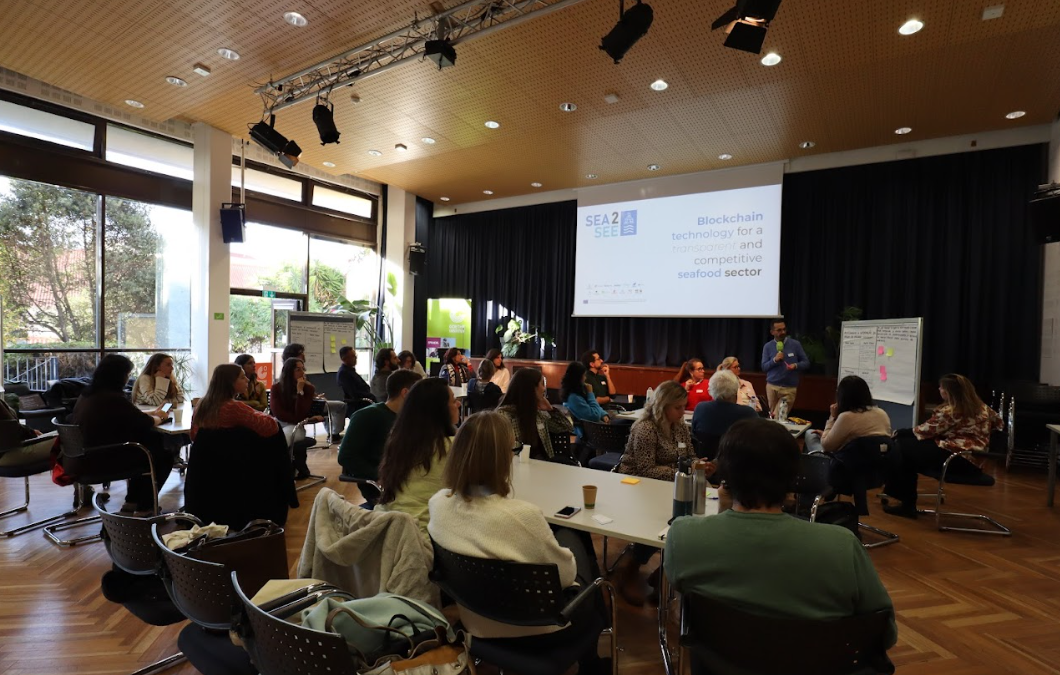Sea2See Project is setting the stage for a more transparent, ethical and sustainable seafood industry in Europe. On November 27, 2024, a project’s working session titled “Traceability and Sustainability from Sea to Plate” brought together stakeholders from across the Portuguese seafood value chain at the Goethe-Institut in Lisbon. The event highlighted the potential of blockchain technology and collaboration to transform the way we source and consume seafood. It was organized and supported by key project partners in Portugal, namely, Associação Natureza Portugal in association with the World Wide Fund for Nature (ANP|WWF), the Centre for Marine Sciences at the University of Algarve (CCMAR), the Centre for Environmental and Marine Studies at the University of Aveiro (CESAM-UA) and SEAentia.
Highlights from the working session
The session was carefully curated to engage stakeholders —including fishers, producers, chefs, NGOs, retailers, and processing companies — in meaningful discussions about traceability and consumption. Key moments included:
Opening session
Rita Sá, Oceans and Fisheries Coordinator at ANP|WWF, welcomed attendees and emphasized the importance of creating synergies within the seafood value chain. She highlighted how the Sea2See Project combines technology with collaboration to address pressing challenges in the seafood industry.
The role of blockchain in seafood traceability
Mafalda Rangel (CCMAR), Cristina Pita and Gisela Costa (CESAM) held presentations on the transformative potential of blockchain technology.
Mafalda Rangel introduced the innovative aspects of the Sea2See Project’s blockchain-based model, emphasizing its ability to capture and share detailed information about seafood throughout its value chain. This transparency allows consumers to trace the origin, fishing or farming methods, and quality tests of the seafood they purchase, promoting informed and responsible choices.
Cristina Pita and Gisela Costa elaborated on how the project’s model combines a mobile app for data collection with a consumer-facing web app, offering real-time transparency. While stakeholders expressed concerns about cost and complexity, the project’s user-friendly design seeks to overcome these barriers and drive widespread adoption. Sea2See’s efforts aim to build trust across the value chain while simplifying the traceability process for all actors involved.
Case Studies: Fuzeta Octopus and SEAentia Meagre
Two compelling case studies showcased the practical application of traceability:
- Fuzeta Octopus (Octopus vulgaris): Sónia Olim, Director of the Associação de Armadores de Pesca da Fuzeta, shared insights into the octopus fishery’s challenges and opportunities. This fishery, a significant contributor to Portugal’s seafood market, faces issues with transparency regarding whether products are locally sourced or imported. Through collaboration with Sea2See, efforts are underway to map the value chain, collect data, and enhance traceability.
- SEAentia Meagre (Argyrosomus regius): Nuno Leite, Founding Partner of SEAentia, introduced the aquaculture of meagre as a sustainable solution to overfishing. Utilizing Recirculating Aquaculture Systems (RAS), SEAentia ensures chemical-free and antibiotic-free production. With Sea2See’s blockchain integration, the objective is to have fully traceable products, aligning with EU goals for sustainable local seafood production.
Strategic session on traceability
Participants engaged in group discussions to perform a SWOT (Strengths, Weaknesses, Opportunities, Threats) analysis of the seafood supply chain. Divided into fishing and aquaculture groups, attendees identified actionable measures to enhance traceability’s role in addressing weaknesses and capitalizing on opportunities. Key recommendations included:
- Simplifying traceability systems to encourage adoption.
- Strengthening collaboration among stakeholders.
- Leveraging traceability to add value and build consumer trust.
A sustainable culinary experience
As part of the session, participants were treated to a sustainable lunch menu featuring octopus and meagre, crafted by the renowned Portuguese chef Fábio Bernardino. The thoughtfully designed dishes highlighted the importance of sustainable sourcing and demonstrated the culinary potential of traceable seafood.
Conclusion: a collaborative path forward
Focussing particularly on the stakeholders and actors in the Portuguese value chain, the Sea2See Project’s Lisbon working session underscored the critical role of innovation and collaboration in building a sustainable seafood industry. By combining blockchain technology with stakeholder engagement, Sea2See empowers European consumers to make informed, responsible choices while fostering trust across the value chain.
As the project continues, the insights gained from this session will inform the ongoing project’s efforts to create a transparent and ethical seafood market in Europe. Together, we can ensure that every seafood product — from sea to plate — is a step toward a more sustainable future.
Contributor: ANP|WWF
……………………………………………………………..
SEA2SEE project was launched in July 2022. It unites 14 partners from six EU countries with a common mission: to enhance consumer trust and acceptance of sustainable seafood. In Portugal, the project is represented by key partners such as the Associação Natureza Portugal in association with the World Wide Fund for Nature (ANP|WWF), the Centre for Marine Sciences at the University of Algarve (CCMAR), the Centre for Environmental and Marine Studies at the University of Aveiro (CESAM-UA) and SEAentia.
At its core, the project introduces a blockchain-based traceability model that provides consumers with comprehensive information about seafood products, including their origin, fishing methods, and processing techniques. By fostering collaboration and raising awareness, Sea2See aims to promote responsible consumption and strengthen the seafood supply chain’s transparency.

